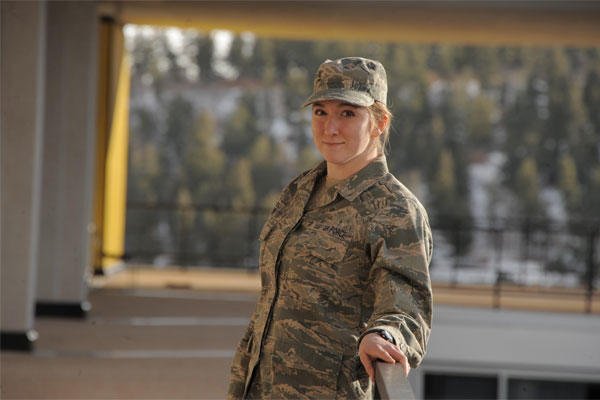U.S. AIR FORCE ACADEMY, Colo. -- In 2005, the Defense Department implemented a national initiative against human trafficking, requiring annual combating trafficking in persons awareness training for all military members on how to combat labor trafficking, sex trafficking and child soldiering.
For Cadet 4th Class Caroline Cotton, it's a fight she's been a part of since she was 17, and through the Academy's CTIP program, she hopes she can educate cadets on the facts of human trafficking and build respect for the women, men and children who are victimized.
"The Air Force is built on respect," she said. "Who is more vulnerable than sexually exploited children? Protecting them from sex trafficking through awareness and decreasing the demand not only makes a good citizen, but is based on the values which we take an oath here to uphold. If little kids and citizens of my country are being deprived of their freedom, then it is my duty to change that."
Nineteen-year-old Cotton said her passion for protecting sex trafficking victims arose when she witnessed a powerful presentation at her high school in Phoenix, Ariz.
"I was researching ways to get involved in stopping human trafficking and found that some states have safe harbor laws (preventing sex trafficking victims under the age of 18 from being prosecuted for prostitution and providing them with specialized services) and realized Arizona does not," she said.
From then on, Cotton said she made a goal to propose and pass a safe harbor law in Arizona, meeting regularly with elected officials and local law enforcement to gain their support and ideas.
"I want children rescued from sex trafficking to be treated as victims rather than criminals," she said. "In the current system in Phoenix, certain minors who were rescued were seen as criminals and sent to jail, often returning to trafficking after being released due to the psychological trauma they faced and the lack of resources available to help them."
Cotton said she's worked with anti-trafficking organizations such as Streetlight USA and the Polaris Project, and attended a conference in Phoenix last spring held by Sen. John McCain's wife, Cindy, and the McCain Institute. The conference included other local and national anti-trafficking organizations.
"I also talked with my high school principal about having health classes incorporate the prevention of sex trafficking in the curriculum," she said. "My principal tentatively approved it, but it was around the time of Basic Cadet Training and I was unable to fully implement the plan. Over spring break, I plan to speak with the new principal about what can be done to implement anti-trafficking curriculum there. My hope is to educate high school-age individuals about the tactics that pimps use to lure and capture young people."
People tend to think of prostitutes as women, who go out and use their bodies for money, have a bad moral compass and are choosing this lifestyle, Cotton said.
"The reality is, young people get tricked by pimps in malls and on the streets," she said. "Everyone is susceptible."
Cotton said people tend to think trafficking victims are being compensated with money, when in reality, the money almost always goes to the pimps. Victims are often starved and beaten, Cotton said.
"One way some pimps force girls to stay is by getting them pregnant and holding their newborn baby like a hostage," she said.
According to the FBI, the average age at which girls first become victims of prostitution is between 12 and 14 and for boys and transgender youth, between 11 and 13.
"They are only children," Cotton said. "In addition to physical trauma, many rescued victims are found to have post traumatic stress disorder and anxiety disorders."
This semester, Cotton saw a poster for CTIP in Harmon Hall and contacted the Academy's program manager, Staff Sgt. Curtis Cardoza to get involved.
"Monthly task force meetings occur at the First United Methodist Church in Colorado Springs," Cardoza said. "I recommended Cadet Cotton to attend one and be a guest speaker. I think that would be great for her and the CTIP program."
Cotton said she hopes to post copies of the poster that first clued her in about CTIP by the elevators and bathrooms in Fairchild Hall. She said she also wants to look into giving an awareness briefing here.
"Cadet Cotton's efforts can greatly benefit the Academy since she's a cadet and is able to spread CTIP information to her peers," Cardoza said.
During CTIP general training, Airmen learn how to define TIP, identify who is involved with it, determine why it occurs and how to combat it.
"We currently have 7,727 here trained out of 8,082, which is a 96 percent total and approximately six percent above Air Force average," Cardoza said. "Aside from the online training, I've created a first-ever CTIP SharePoint site that is accessible to everyone on base. The site contains Academy training statistics, current events, reporting hotline and other informational material. I hope people gain a sense of awareness from the training."
Cotton, an engineering major, said she will proceed with her anti-trafficking efforts after she is through with the time constraints of a fourth class cadet.
"I love my freedom, my fellow citizens' freedom, my future children's freedom and I will protect it," she said.



























